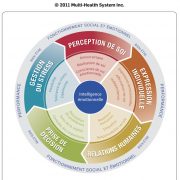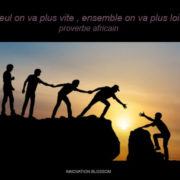Innovation a school of emotional intelligence
“The challenge of going to Mars is also psychological,” repeats Thomas Pesquet, explaining that the technical limits will certainly be exceeded, but that men are confronted with their neurological and emotional limits. Technological innovation, with its new uses, creates a new reality that provokes all kinds of emotions starting with the fear of the unknown. Innovators are at the heart of emotional games that they must master in order to persevere in the face of the inevitable obstacles of innovative projects. I dedicate to emotional intelligence, demonstrated by innovators by obligation and by taste, the first chapter of my book “Knowledge-Innovation, the innovation attitude to adapt to the changing world” and whose I give you some keys in this article.
1) Identify your EQ (Emotional Quotient)
In coaching as in innovation, the first step is to clarify the problem. What is my EQ? What are the balanced emotions that make me strong and the unbalanced ones that can create my personal and relational fragility? The EQi Test and Wheel (tool link) allow you to visualize them at a glance.
There is no good or bad profile, the personality and the unique functioning of each result from education, failures and successes from the needs and deep values of each, but it is certain that to face innovation certain emotional skills are necessary..
2) The emotions encountered when innovating
It turns out that the uncertainty that reigns when one innovates provokes all the range of basic emotions: fear of failure, good or bad surprise, the anger of skeptics in the face of a disruptive idea, the sadness of a abandoned, the joy of the success of the project and all the emotions of well-being when you create in your flow.
In any case, innovators ignore the sadness of “it was better before”, and even if they give in to anger like the famous outbursts of Steve Jobs, they come out of it very quickly, to focus positively on their project.
3) Practice the emotional shift
Constantly confronted with emotional mountains, innovators are used to the emotional shift, this attitude that allows you to change state, to go from an emotion that makes you negative to one that makes you positive. The example of Elon Musk, faced with the explosion of his rocket on takeoff, illustrates this ability not to be overwhelmed by anger or the sadness of failure and to positively experience it as an experience to learn and correct. . It is also necessary for any leader to be able to adopt a positive emotional state to train the teams.
4) Develop specific emotional skills
Practicing innovation therefore requires many soft skills that are essential for success. For this, in the wheel of the EQi, it is better to obtain good scores in the subscales related to innovation such as problem solving of course, but also self-realization because you have to feel good in his life to be sure of himself, and the independence to remain convinced of his idea despite all the detractors.


